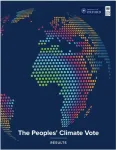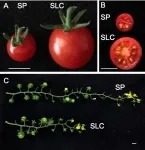World's largest opinion survey on climate change: Majority call for wide-ranging action
UNDP's 'Peoples' Climate Vote' reflects views of over half the world's population after results processed by Oxford University; 64% believe climate change is a global emergency
2021-01-27
(Press-News.org) New York - The results of the Peoples' Climate Vote, the world's biggest ever survey of public opinion on climate change are published today. Covering 50 countries with over half of the world's population, the survey includes over half a million people under the age of 18, a key constituency on climate change that is typically unable to vote yet in regular elections.
Detailed results broken down by age, gender, and education level will be shared with governments around the world by the United Nations Development Programme (UNDP), which organized the innovative poll with the University of Oxford. In many participating countries, it is the first time that large-scale polling of public opinion has ever been conducted on the topic of climate change. 2021 is a pivotal year for countries' climate action commitments, with a key round of negotiations set to take place at the UN Climate Summit in November in Glasgow, UK.
In the survey, respondents were asked if climate change was a global emergency and whether they supported eighteen key climate policies across six action areas: economy, energy, transport, food & farms, nature and protecting people.
Results show that people often want broad climate policies beyond the current state of play. For example, in eight of the ten survey countries with the highest emissions from the power sector, majorities backed more renewable energy. In four out of the five countries with the highest emissions from land-use change and enough data on policy preferences, there was majority support for conserving forests and land. Nine out of ten of the countries with the most urbanized populations backed more use of clean electric cars and buses, or bicycles.
UNDP Administrator Achim Steiner said: "The results of the survey clearly illustrate that urgent climate action has broad support amongst people around the globe, across nationalities, age, gender and education level. But more than that, the poll reveals how people want their policymakers to tackle the crisis. From climate-friendly farming to protecting nature and investing in a green recovery from COVID-19, the survey brings the voice of the people to the forefront of the climate debate. It signals ways in which countries can move forward with public support as we work together to tackle this enormous challenge."
The innovative survey was distributed across mobile gaming networks in order to include hard-to-reach audiences in traditional polling, like youth under the age of 18. Polling experts at the University of Oxford weighted the huge sample to make it representative of the age, gender, and education population profiles of the countries in the survey, resulting in small margins of error of +/- 2%.
Policies had wide-ranging support, with the most popular being conserving forests and land (54% public support), more solar, wind and renewable power (53%), adopting climate-friendly farming techniques (52%) and investing more in green businesses and jobs (50%).
Prof. Stephen Fisher, Department of Sociology, University of Oxford, said: "The survey - the biggest ever survey of public opinion on climate change - has shown us that mobile gaming networks can not only reach a lot of people, they can engage different kinds of people in a diverse group of countries. The Peoples' Climate Vote has delivered a treasure trove of data on public opinion that we've never seen before. Recognition of the climate emergency is much more widespread than previously thought. We've also found that most people clearly want a strong and wide-raging policy response."
The survey shows a direct link between a person's level of education and their desire for climate action. There was very high recognition of the climate emergency among those who had attended university or college in all countries, from lower-income countries such as Bhutan (82%) and Democratic Republic of the Congo (82%), to wealthy countries like France (87%) and Japan (82%).
Notes to Editors:
The percentage of a population estimated to support a particular policy does not indicate that those who did not are against the same policy, since not endorsing a policy could also be due to indifference to it.
The country results present what people think who are physically in a particular country. They are not representative of what nationals of a particular country think. So for example, they are representative not of what French people think, but of people in France.
INFORMATION:
UNDP is the leading United Nations organization fighting to end the injustice of poverty, inequality, and climate change. Working with our broad network of experts and partners in 170 countries, we help nations to build integrated, lasting solutions for people and planet.
Learn more at undp.org or follow @UNDP
[Attachments] See images for this press release:

ELSE PRESS RELEASES FROM THIS DATE:
2021-01-27
DALLAS (SMU) - Wildfires are the enemy when they threaten homes in California and elsewhere. But a new study led by SMU suggests that people living in fire-prone places can learn to manage fire as an ally to prevent dangerous blazes, just like people who lived nearly 1,000 years ago.
"We shouldn't be asking how to avoid fire and smoke," said SMU anthropologist and lead author Christopher Roos. "We should ask ourselves what kind of fire and smoke do we want to coexist with."
An interdisciplinary team of scientists published a study in the journal Proceedings of the National Academy of Sciences documenting centuries of fire management ...
2021-01-27
The United States Department of Agriculture identifies a group of "big eight" foods that causes 90% of food allergies. Among these foods are wheat and peanuts.
Sachin Rustgi, a member of the Crop Science Society of America, studies how we can use breeding to develop less allergenic varieties of these foods. Rustgi recently presented his research at the virtual 2020 ASA-CSSA-SSSA Annual Meeting.
Allergic reactions caused by wheat and peanuts can be prevented by avoiding these foods, of course. "While that sounds simple, it is difficult in practice," says Rustgi.
Avoiding wheat and peanuts means losing out ...
2021-01-27
Tsukuba, Japan - Tomatoes are one of the most popular types of fresh produce consumed worldwide, as well as being an important ingredient in many manufactured foods.
As with other cultivated crops, some potentially useful genes that were present in its South American ancestors were lost during domestication and breeding of the modern tomato, Solanum lycopersicum var. lycopersicum.
Because of its importance as a crop, the tomato genome sequence was completed and published as long ago as 2012, with later additions and improvements. Now, the team at University of Tsukuba, in collaboration with TOKITA Seed Co. Ltd, have produced high-quality genome sequences of two wild ancestors of tomato from Peru, Solanum pimpinellifolium ...
2021-01-27
Children of all ages can completely bypass age verification measures to sign-up to the world's most popular social media apps including Snapchat, Instagram, TikTok, Facebook, WhatsApp, Messenger, Skype and Discord by simply lying about their age, researchers at Lero, the Science Foundation Ireland Research Centre for Software have discovered.
And even potential age verification solutions identified by the research team can be easily sidestepped by children, according to the team's most recent study: Digital Age of Consent and Age Verification: Can They Protect Children?
Lead researcher Lero's Dr Liliana Pasquale, assistant professor at University College ...
2021-01-27
Harpy eagles are considered by many to be among the planet's most spectacular birds. They are also among its most elusive, generally avoiding areas disturbed by human activity - therefore already having vanished from portions of its range - and listed by the International Union for the Conservation of Nature (IUCN) as being 'Near-Threatened'.
However, new research led by the University of Plymouth (UK) suggests estimates of the species' current distribution are potentially overestimating range size.
Using a combination of physical sightings and environmental data, they developed a spatial modelling framework which aims to estimate current and past distributions based on the birds' preferred habitat conditions.
The authors then used the model to estimate a ...
2021-01-27
Multi-disciplinary researchers at The University of Manchester have helped develop a powerful physics-based tool to map the pace of language development and human innovation over thousands of years - even stretching into pre-history before records were kept.
Tobias Galla, a professor in theoretical physics, and Dr Ricardo Bermúdez-Otero, a specialist in historical linguistics, from The University of Manchester, have come together as part of an international team to share their diverse expertise to develop the new model, revealed in a paper entitled 'Geospatial distributions reflect temperatures of linguistic feature' authored by Henri Kauhanen, Deepthi Gopal, ...
2021-01-27
(Scottsdale, Ariz. - January 27, 2021) HIRREM (the legacy research technology of Cereset - a Brain State Company) was utilized by the Wake Forest School of Medicine to study symptoms of traumatic stress in military personnel before and after use of Cereset (legacy) intervention.
Whole brain, resting state magnetic resonance imaging (MRI) was done pre- and post- Cereset intervention. Significant effects on brain network connectivity have been previously reported.
For the current study, lateralization of brain connectivity was analyzed. Lateralization here refers to the distribution of brain connections within the right, and left side, or to the opposite side. This is important because common lobes in the ...
2021-01-27
Montreal, January 27, 2021 - Taking cannabidiol, a chemical in the cannabis sativa plant, isn't an effective way to reduce your dependence on cocaine, researchers at the CHUM Research Centre find.
In North America, close to 5.5 million people use cocaine regularly, and nearly one in five becomes addicted, developing cocaine use disorder, for which there is no clinical treatment. One solution has been touted, however: treatment with cannabidiol.
Better known as CBD, it's a chemical in the cannabis sativa plant known for its protective effects on the brain and liver. But there is very little scientific evidence to support its use as a treatment for addiction.
In fact, in a study published ...
2021-01-27
Stopping the spread of COVID-19 is difficult enough. It's even more complicated and confusing when information and resources provided by governments are largely inaccessible to a variety of disabled populations. A newly-published global survey of national health authority websites in nearly 200 countries has directly quantified COVID-19 information accessibility.
The survey, published on January 27, 2021 in the journal Frontiers in Medicine, was conducted by researchers and medical professionals from Bar-Ilan University's Azrieli Faculty of Medicine, the Galilee Medical Center and Tel Aviv ...
2021-01-27
As the climate warms and Arctic sea ice retreats, research vessels and commercial ships are sailing into the Arctic Ocean more and more, but the accuracy and sensitivity of regional weather and marine forecasts for these hazardous waters still lag well behind those of their lower-latitude counterparts, with significant differences between regional models. Direct measurements of atmospheric conditions, such as cloud cover and solar radiation, can help to evaluate and improve these models.
In a new study published in the Journal of Geophysical Research: Atmospheres, a research team led by the National Institute of Polar Research in Tachikawa, ...
LAST 30 PRESS RELEASES:
[Press-News.org] World's largest opinion survey on climate change: Majority call for wide-ranging action
UNDP's 'Peoples' Climate Vote' reflects views of over half the world's population after results processed by Oxford University; 64% believe climate change is a global emergency








